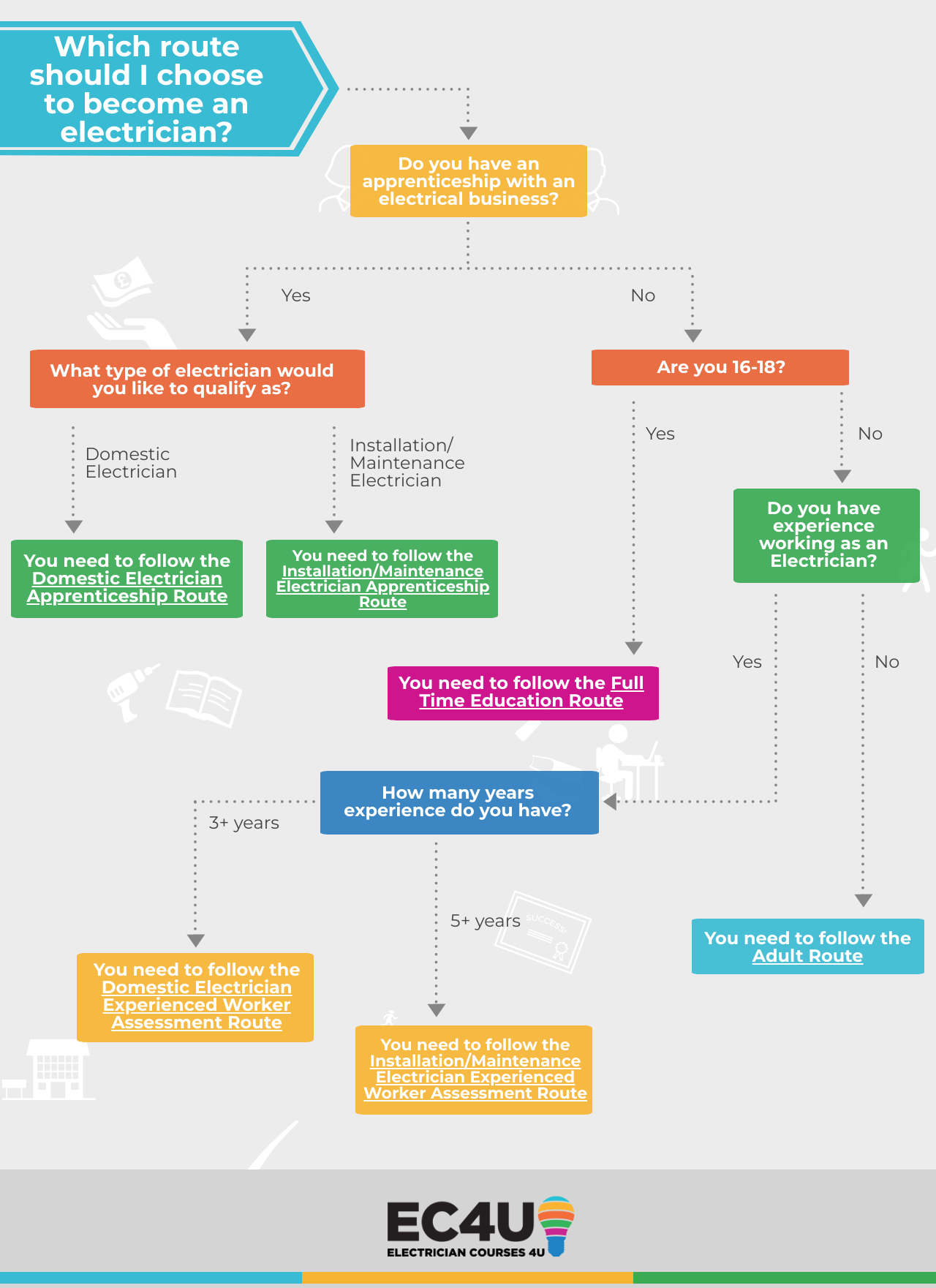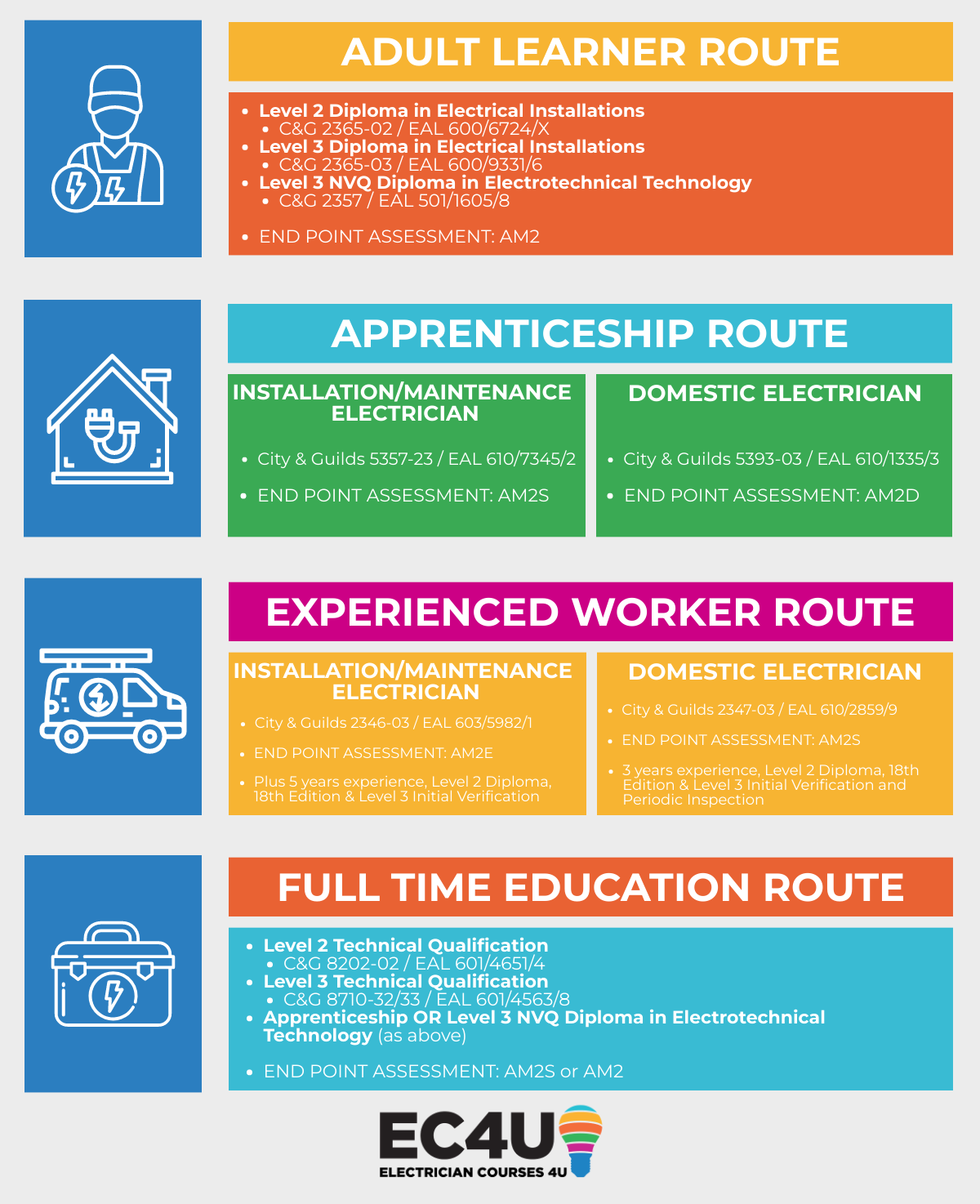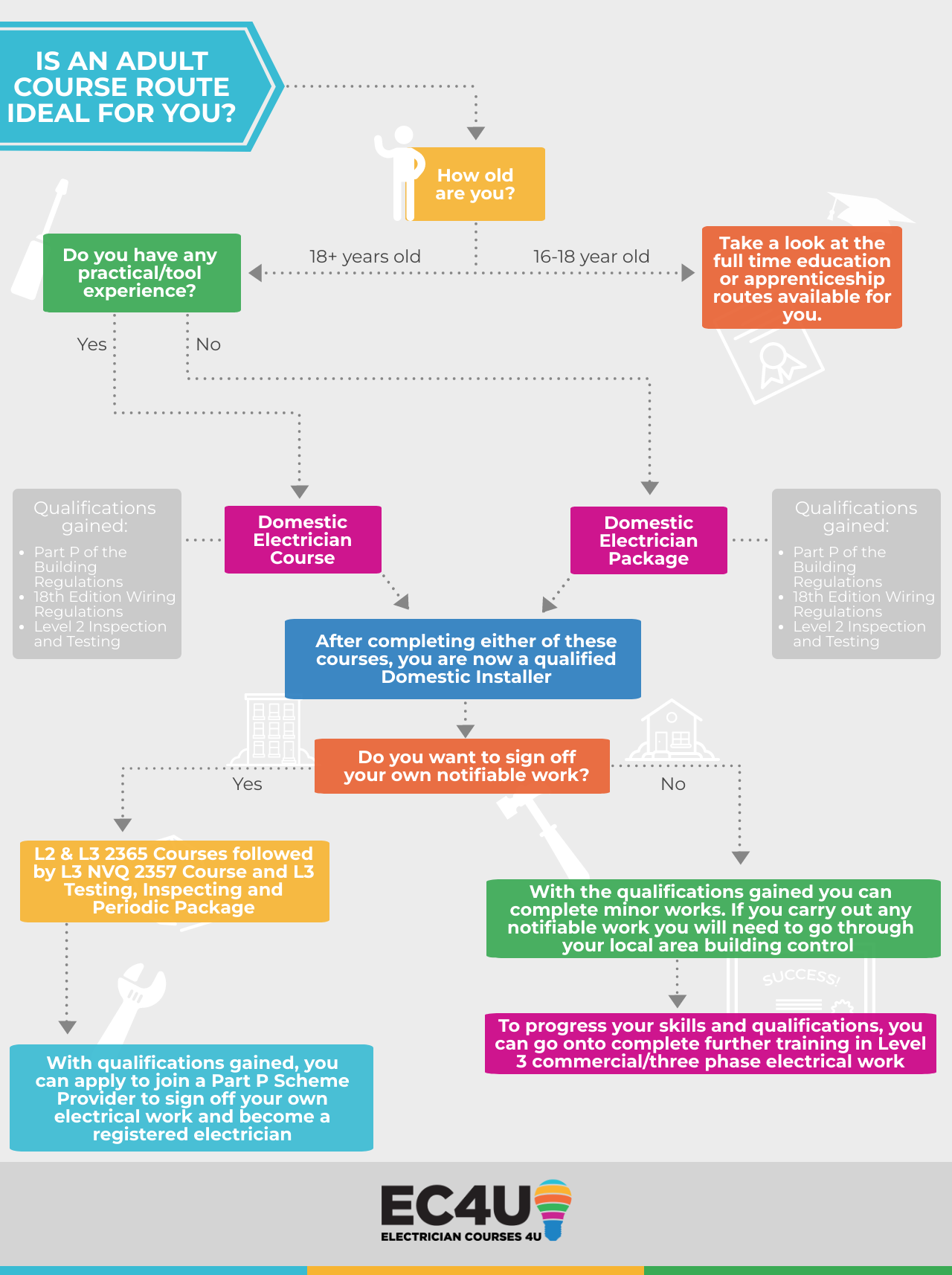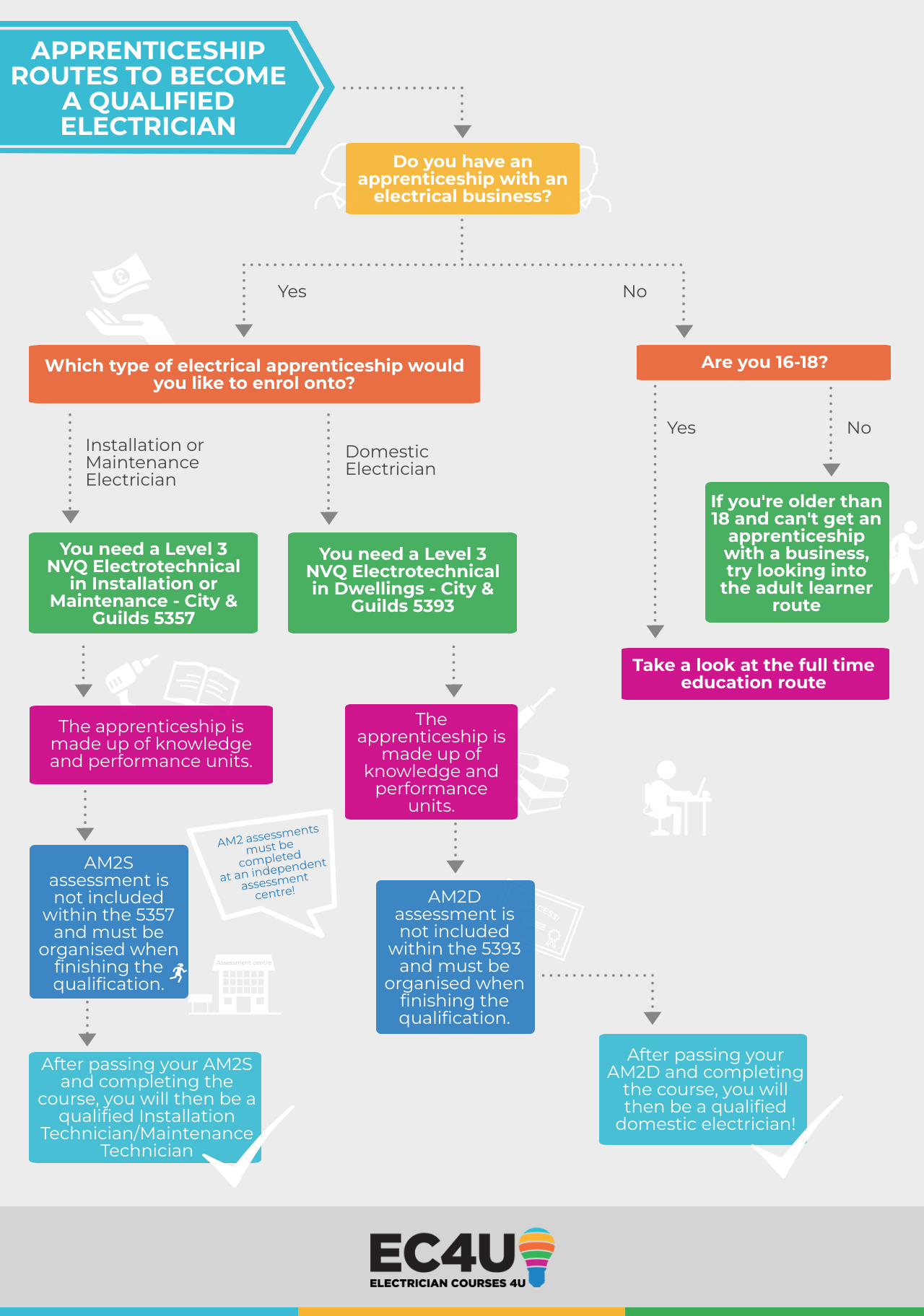How to Become an Electrician in the UK
If you are looking at how to become an electrician in the UK, looking to retrain and change your career or simply just want to add electrics to your existing trade skill set, it’s important that you get the best training and electrician qualifications.
There are a variety of training routes available for you to become a qualified electrician. The traditional route involves an NVQ electrical apprenticeship, however, with apprenticeship salaries as low as £7.55/ph and guided learning time requirements, they sometimes aren’t suitable for everyone.
If you are an adult learner who is looking to retrain and change career, then there is an intensive route available, which takes into account the time and monetary constraints that you may be facing.
Use these links below to skip ahead to the section you’re most interested in.
– Pathways to electrician qualification in the UK
– UK electrician prerequisites?
– The different types of electrician
– Routes to becoming a qualified electrician
– What are the skills required to be an electrician?
– How long does it take to become an electrician?
– FAQs
Pathways to electrician qualification in the UK
There are four main routes to becoming an electrician in the UK; the adult course route, the apprenticeship route, the experience worker assessment route, and the full-time education route. Each route is designed to teach you the necessary skills and knowledge to become a qualified electrician but which route you decide to take will depend on your age, circumstances and experience.
Electrical apprenticeship route
Earn while you learn with an electrical apprenticeship. You will not be expected to pay anything towards your training and will gain skills through on-the-job learning in your workplace and classroom learning supported by a college or training provider.
Adult learner (diploma) route
This route is designed for those who want to learn, develop and practice the skills necessary for employment in the electrotechnology sector. These qualifications serve as the foundation of becoming a fully qualified electrician. This is the most popular route for adult learners and career changers who want to invest in their own training. Explore our electrician training courses to see the options.
Experienced Worker Assessment
The assessment process to recognise occupational competence for those who have worked in the electrical industry for a number of years but have not completed an apprenticeship or achieved the vocational qualifications.
Full time education
If you are under the age of 19, you may undertake this classroom-based route that provides you with the technical knowledge and practical skills that you can gain at a college or training centre. You will still need to get practical workplace experience before you can become a fully qualified electrician.
You can find in-depth information about each of the different routes to becoming an electrician in the UK further down this article.

UK electrician prerequisites
If you opt for an apprenticeship or college course, you’ll be required to hold 2 or more GCSEs at grades 9 to 3 (A* to D), or equivalent, for a level 2 course. 4 or 5 GCSEs at grades 9 to 4 (A* to C), or equivalent, for a level 3 course, and so forth. However, if you choose to complete your training with a private provider you won’t need any previous academic qualifications.
Basic electrical knowledge
No matter which training pathway you choose, it is a good idea to build your basic electrical knowledge. We already have a guide to electrical terminology which will help you to become familiar with important topics. You may also wish to take a look at organisations such as The IET and The Electrotechnical Skills Partnership which offer further advice on careers in the electrical sector.
As well as our guide to electrical terminology, you can take a look at what different cables are around your home, or why not take a look inside a plug socket, consumer unit or lighting circuit?
If you’re still not sure which route is the most suitable, why not enrol into our Electrical Course for Beginners? This course will give you a solid foundation of electrical knowledge as well as an opportunity to learn invaluable practical skills.

The different types of electrician
There are many different types of electricians, each with their own unique set of skills and niches within the sector. This allows you to specialise in an area that is of particular interest, or to play to your strengths when choosing your career. Of course, there is some crossover between them, providing transferable skills and opportunities to move between different disciplines.
Domestic
Domestic electricians install, maintain and repair electrical systems in domestic properties. This role covers everything from minor installations and fixes to complete home rewiring. Domestic electricians also work alongside construction companies to install electrical systems in new-build homes and apartments.
Commercial
Commercial electricians work for businesses, installing, maintaining and repairing electrical systems in offices, retail buildings and other commercial spaces. Their role includes ensuring that these environments are safe, efficient and compliant with relevant regulatory standards for their use.
Industrial
Industrial electricians predominantly carry out work in factories, manufacturing plants and other industrial settings. This can be a highly specialised profession, with safety, efficiency and innovation being key aspects of the role. Some industrial electricians choose to work in a singular sector, allowing them to become highly experienced within a niche.
Utility
Utility electricians work for power companies, substations, solar farms and a variety of other utilities. Their role is to install the electrical systems that provide homes and businesses with power, as well as support the functionality of other utilities such as gas and water. As well as installation, utility electricians also troubleshoot, repair and optimise electrical systems to ensure safety and efficiency.
Learn more about the roles and responsibilities of electricians.
Routes to becoming a qualified electrician
There are various different pathways to becoming an electrician in the UK. This makes it a great career opportunity for a wide variety of people with different learning styles and preferences. You might like to take a look at our guide to qualifications for more information about levels, certificates, diplomas and degrees.
Adult Learner Route
The adult learner route is tailored for individuals (18+ or older) seeking a career transition into electrical work. Upon completion of an intensive adult course, you will emerge as a fully qualified Level 3 Electrician.
Although the structure of the adult learner route may vary across training facilities, they all lead to a Level 3 NVQ in Electrical Installation or Maintenance. This qualification is required for joining a Competent Persons Scheme or applying for an ECS Gold Card.
However, please note that classroom-based qualifications alone do not make you a qualified electrician; you also need on-the-job experience and work-based training. If you cannot access funding, you must pay for your own training.
If you are new to the industry, then we would suggest our Domestic Electrician Package, which is the same as our Domestic Electrician Course for the first 15 days, and then goes on to include our unique Experience Course.
Electrician Courses 4U – 4-Stage Process
Here at Electrician Courses 4U, we have developed a 4 stage process to help you achieve your NVQ qualification in the most flexible and cost-effective way possible. This is aimed at anyone 18+ and cannot afford either the time or cost associated with the other training routes.
1. Domestic Installer Course
Our route starts with our Domestic Installer Course, throughout which you will gain your initial suite of qualifications:
– Part P of the Building Regulations (2393-10)
– 18th Edition Wiring Regulations (2382-22)
– Level 2 Inspection & Testing (2392-10)
Once completing this course you can complete minor works in domestic settings. You can still complete notifiable works, however, you just need to go through your local area building control to notify the work.
2. Level 2 Diploma in Electrical Installations (2365-02) from City & Guilds
The next stage is the Level 2 Diploma in Electrical Installations (2365-02) which will allow you to build on the skills and knowledge previously developed on the Domestic Electrician Course.
3. Level 3 Diploma in Electrical Installations (2365-03)
After successful completion of the Level 2 Diploma, the next step is to move on to the Level 3 2365 Diploma in Electrical Installations (2365-03).
4. Level 3 NVQ Diploma in Installing Electrotechnical Systems and Equipment (Buildings, Structures, and the Environment) (2357) from City & Guilds
You will be able to take all of the unit credits you have earned during your previous courses and transfer them into the Level 3 NVQ Diploma in Electrotechnical Technology (2357). This instantly completes all the knowledge and theory units within the qualification, leaving you with a practical evidence portfolio to build and develop.
To achieve your final qualification, you must take the industry assessment of competence, the AM2, which tests everything you’ve learned during your training. Upon passing, you will officially be a qualified electrician.
If you are hoping to join a Government Approved Part P Scheme Provider and self-certify your work, you will also need to complete our Level 3 Inspection and Testing course.
You can read more about EC4U’s route to becoming a qualified electrician.

Apprenticeship Route
The apprenticeship route to becoming a qualified electrician offers essential on-the-job experience paired with structured training. With skilled trades becoming an increasingly attractive option among the UK’s young workers, apprenticeships have become the preferred choice, offering both practical learning and soft skill development.
While traditionally targeted at the young, apprenticeships are open to all ages. Employment is a must, allowing hands-on learning supported by educational institutions.
The typical duration is 4 years, funded by employers, alleviating financial burdens on apprentices. Two apprenticeship routes cater to individuals aged 16-19, considering whether they’ve secured a position with an electrical business.
There are two apprenticeship options for aspiring electricians:
1. Installation/Maintenance Electrician Apprenticeship
This apprenticeship focuses on installing, maintaining, and repairing electrical systems in various environments. Participants will take the Level 3 5357 NVQ Electrotechnical course and complete the AM2S assessment to become a qualified electrician. The course will take 4 years to complete and requires you to be employed as an apprentice before enrollment.
2. Domestic Electrician Apprenticeship
This apprenticeship is designed for those working in domestic properties, such as homes and individual units. Participants will take the Level 3 5393 NVQ Electrotechnical course and complete the AM2D assessment to become a qualified electrician. The course duration is 3 years and the course requires you to be employed as an apprentice before you enrol.
Upon completion of either an AM2S or AM2D assessment, you will be officially recognised as an Installation or Maintenance Electrician or Domestic Electrician. By following the structured apprenticeship route, you ensure comprehensive training and a clear pathway to becoming a qualified electrician.

Experienced Worker Assessment Route
The Experienced Worker Assessment Route is tailored for individuals with industry experience but who lack a formal apprenticeship or Level 3 vocational qualification.
There are two course options available; either the Installation/Maintenance Electrician Experienced Worker Qualification or the Domestic Electrician Experienced Worker Qualification. Both are assessed against equivalent apprenticeship standards.
Before enrolling, candidates must verify their industry experience, with at least 5 years for the Installation/Maintenance route and 3 years for the Domestic Electrician route. Additionally, a Level 2 Electrical Technical qualification is required.
Once you have ensured you meet the above criteria and have decided which course you would like to complete, you can then look at completing the EWA skills scan and candidate background form. You’re then ready to find a training provider and get enrolled onto the course. Alongside the Experienced Worker Level 3 Performance Units, participants must also obtain their 18th Edition Wiring Regulations and Level 3 Testing & Inspection qualifications if you do not already hold these.
The final step is the AM2E (Installation/Maintenance) or AM2ED (Domestic) end point assessment, which upon successful completion, gives individuals qualification for Competent Persons Schemes or ECS Gold Cards.
Full-Time Education Route
This educational pathway caters to individuals under the age of 19 who lack an apprenticeship. For individuals over 19, funding opportunities may be accessible through employers or government support. Initially, full-time college attendance is permitted, offering a pathway to future employment in the electrical industry. The journey begins with a Level 2 Technical qualification in Electrical Installations, followed by progression to a Level 3 Technical qualification.
Please note that practical experience remains and is essential to become a qualified electrician. Upon completing the technical qualifications, individuals face a choice between an apprenticeship or Level 3 NVQ. An apprenticeship allows for the accreditation of existing knowledge and experience, potentially reducing the time required for completion. Opting for the Level 3 NVQ Course enables work as either a self-employed or employed electrician.
Typically, the journey commences at City & Guilds Level 2 8202 Electrician Course, with progression to the Level 3 T Level Electrician Course if not transitioning to an apprenticeship. Each technical qualification usually takes about a year, culminating in approximately four years to attain qualified electrician status.
Before concluding either an apprenticeship or NVQ, passing the relevant end-point assessment is necessary, involving either the AM2S or AM2D for apprenticeships or the AM2 for the NVQ.
What are the skills required to be an electrician?
If you want to become an electrician, then you’ll need to work on your electrician skills. These skills are broadly categorised into technical skills and soft skills which each play a role in the success and efficiency of your work. Here’s a list of the top skills you’ll need:
Technical Skills
- – Problem-solving and mathematical skills
– Technical knowledge
– Safety awareness
– Attention to detail- Use of electrical tools and equipment
Soft Skills
- – Working well with others
– Good communication skills
– Time management skills
– Honesty
– Patience
– Adaptability and flexibility
How long does it take to become an electrician?
The timeline to become an electrician varies depending on the chosen path:
– Full-time education takes 1-2 years, followed by on-the-job training
– Apprenticeships usually take around 3-4 years, combining on-site work with college
– Part-time or evening courses take much longer
– Domestic installer courses offer a quicker route (as little as a month), however, you will only be able to complete minor works in domestic settings with this course and will need more training if you want to notify your own work.
Key organisations
Several key organisations play a crucial role in the electrician industry, providing guidance, certification, and support for professionals. Below are some of the most significant organisations and schemes that help shape the skills and standards within the industry.
The Electrotechnical Skills Partnership (TESP)
The Electrotechnical Skills Partnership (TESP) is a not-for-profit industry initiative created by the Electrical Contractors Association (ECA), Joint Industry Board (JIB), National Electrotechnical Training (NET), SELECT, and Unite the Union. Its mission is to support electrotechnical employers in advancing and shaping the industry’s skills agenda.
TESP has developed a series of recommended training routes to offer clear guidance on the correct pathways to becoming a qualified electrician in the UK.
ECS Gold Card Scheme
The Installation Electrician ECS Gold Card is designed for Level 3 NVQ-certified professionals who independently install, commission, and maintain low-voltage electrical and electronic equipment in consumer electrical systems.
This Gold Card signifies that the holder has completed a formal industry-regulated, competency-based qualification, encompassing both technical theory and practical competency assessments.
Competent Person Schemes (CPS)
Joining a Competent Person Scheme (CPS) such as NICEIC or NAPIT allows building trade installers to self-certify specific types of work without needing separate building regulations approval.
The benefits of this include avoiding the need for local council or private building inspectors to check your work as well as offering customers lower prices by eliminating building control fees.
Membership in a CPS is voluntary; you still have the option to use local council or private inspectors if you prefer.
Frequently asked questions
How much do electricians earn?
The electrician’s salary is quite competitive, with electricians earning an average hourly wage of £20.90. This rate is nearly double the National Minimum Wage for workers aged 23 and over, which is currently set at £11.94. For new starters, this is the typical earning rate, but as you gain more experience and progress in your career, you can expect to earn even more.
Do you need an NVQ to become an electrician?
Yes you need to have an NVQ Level 3 qualification to become a qualified electrician. This is an essential requirement for entry into this field.
Can I become an electrician without going to college?
Yes, you can become an electrician without attending college. Alternative routes include apprenticeships, adult learner diploma programs, or gaining experience through the Experienced Worker Assessment route. These pathways offer practical training and certifications without the need for traditional college attendance.
What industries can electricians work in?
Electricians can work in a variety of industries, including construction, manufacturing, maintenance, telecommunications, renewable energy, and residential services. They are essential in ensuring the functionality, safety, and efficiency of electrical systems across various sectors, ranging from commercial buildings to industrial facilities and residential homes.
Can you become an electrician without qualifications?
While formal qualifications like NVQs or apprenticeships are typically needed for full qualification as an electrician, alternative routes exist. These include gaining experience in entry-level roles, adult learner programs, or experienced worker assessments. However, having qualifications greatly enhances job prospects and ensures compliance with industry standards.
What is the fastest way to become an electrician?
The fastest way to become an electrician is typically through an intensive training program or an apprenticeship, where you can gain practical experience while learning the necessary skills. These programs often offer accelerated learning paths compared to traditional academic routes, allowing you to enter the workforce more quickly.
What level is a fully qualified electrician?
A fully qualified electrician typically achieves a Level 3 qualification, such as an NVQ Level 3 in Electrical Installation or equivalent, which demonstrates competency in electrical installation, maintenance, and repair work.
What type of electrician is most in demand?
Electricians with expertise in areas like industrial electrical systems and smart technologies are often in high demand due to advancements in these fields and the growing emphasis on sustainability and efficiency. Residential electricians who can perform maintenance, repairs, and installations in homes are also sought after due to ongoing construction and renovation projects.
Are you thinking about becoming an electrician?
Take a look at our electrical courses to find out more about the UK’s leading practical training centre and what we offer. Whether you have no experience at all or are already working in the industry, we have a level of course to suit you. We also provide in-centre and online electrical training courses to suit your availability. Get in touch with us to discuss your route to becoming an electrician today.




